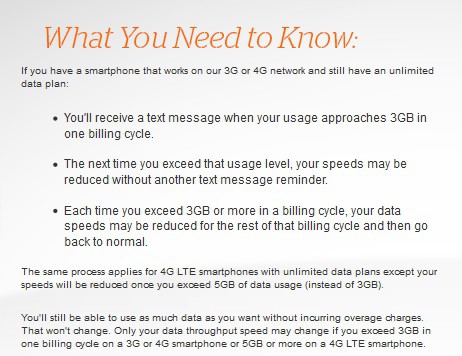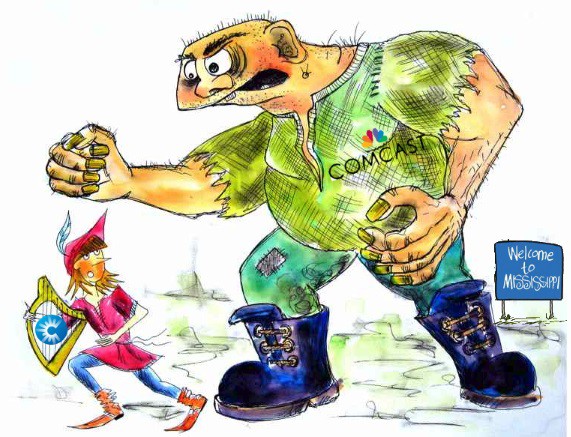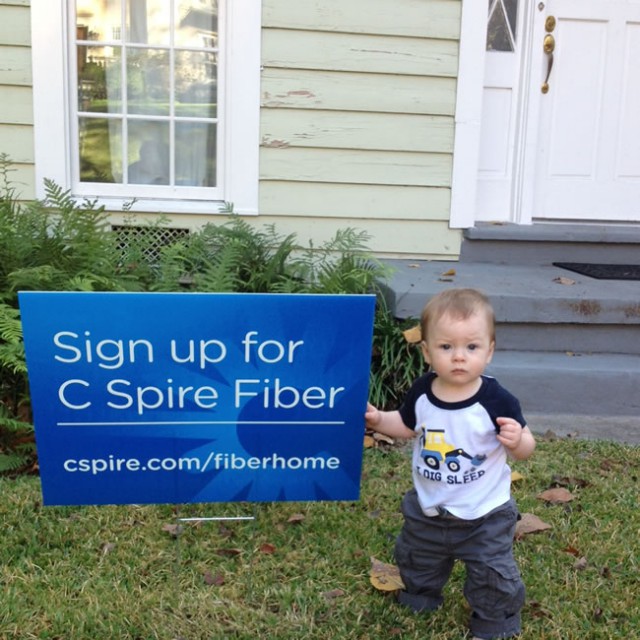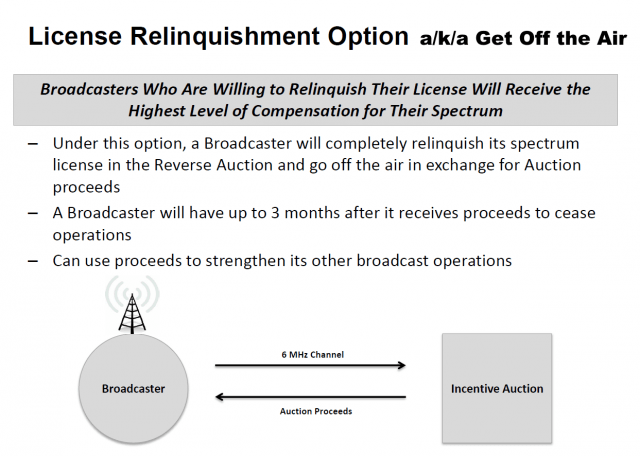 Rural Americans who cannot get cable broadband or DSL will now pay more money for less service as wireless carriers continue to cancel affordable mobile broadband plans with a generous usage allowance in favor of premium-priced, stingy usage-capped wireless Internet.
Rural Americans who cannot get cable broadband or DSL will now pay more money for less service as wireless carriers continue to cancel affordable mobile broadband plans with a generous usage allowance in favor of premium-priced, stingy usage-capped wireless Internet.
Two weeks after Millenicom was forced to drop affordable Verizon wireless broadband service, Blue Mountain Internet received word its unlimited Sprint broadband reseller agreement was being terminated the following day, forcing the company to hurry out cancellation notices to affected customers.
“We received notification yesterday from our upline provider that our mobile broadband accounts utilizing the Sprint network (Net2) will all be cancelled on Friday, Oct. 31st, 2014,” the company wrote in an email to customers. “We apologize for the short notice but we just received notice yesterday.”
BMI had offered customers an unlimited use mobile broadband plan from Sprint for $99 a month. It has been replaced with a Verizon plan that costs a dollar more and comes with a 10GB monthly data allowance with a steep $20/GB overlimit fee. “Heavy users” can pay $120 a month for a monthly allowance of 20GB. Affected customers intending to switch to Verizon get a discount off the monthly plan price if they pay quarterly: $85 (10GB) or $100 (20GB).
Blue Mountain Internet Mobile Broadband Rental Prices & Plans
| Package | Network | Traffic | Traffic | AV | Optimizer | Best Price | Monthly | Quarterly | |
| Optimized | Accts | Licenses | Software | paying quarterly | 3 months | ||||
| VMBB-HalfGig | 1 | 1/2Gb | 1.5Gb | 1 | 1 | Yes | $19.99/Mo | $24.95 | $59.97 |
| VMBB-1GB | 1 | 1Gb | 3Gb | 1 | 2 | Yes | $34.95/Mo | $39.99 | $104.85 |
| VMBB-3GB | 1 | 3Gb | 9Gb | 1 | 2 | Yes | $52.95/Mo | $59.99 | $158.85 |
| VMBB-5GB | 1 | 5Gb | 15Gb | 1 | 2 | Yes | $69.99/Mo | $79.99 | $209.97 |
| VMBB-10GB | 1 | 10Gb | 30Gb | 1 | 2 | Yes | $84.95/Mo | $99.99 | $254.85 |
| VMBB-20GB | 1 | 20Gb | 60Gb | 1 | 2 | Yes | $99.99/Mo | $119.99 | $299.97 |
| Plan Details: Network 1 Overages are charged at a rate of $20/Gigabyte – regardless of plan. Hardware options available or you can bring your own device (BYOD). Traffic optimizer software is free for Windows & Macintosh. Optimizer does not compress video or already compressed files. | |||||||||
EVDOinfo notes that with Millenicom and BMI losing their relationships with Verizon and Sprint respectively over the course of just one month, “it seems unlikely that we’ll see another [reseller] emerge with a no-contract, high-data plan using one of the major carriers’ networks.”
Millenicom customers were being offered a slightly different plan if they agreed to switch to a Verizon Wireless account: 20GB a month for $99 with a $15/GB overlimit fee. Customers signing up for a “More Everything” plan will pay considerably more. A 30GB plan with a mobile hotspot device costs $150 a month, not including fees and taxes. A one-year contract commitment usually applies.


 Subscribe
Subscribe The Federal Trade Commission today filed a lawsuit against AT&T for its practice of subjecting grandfathered unlimited data customers to speed throttles that dramatically cut speeds up to 90 percent after customers use more than 3GB of data on AT&T’s 3G network or 5GB on its 4G network. Thus far, according to the FTC, AT&T has throttled at least 3.5 million unique customers a total of more than 25 million times.
The Federal Trade Commission today filed a lawsuit against AT&T for its practice of subjecting grandfathered unlimited data customers to speed throttles that dramatically cut speeds up to 90 percent after customers use more than 3GB of data on AT&T’s 3G network or 5GB on its 4G network. Thus far, according to the FTC, AT&T has throttled at least 3.5 million unique customers a total of more than 25 million times.
 The sleepy deep south isn’t often a battleground for an all-out broadband competition war, but Ridgeland, Miss.-based C Spire, a regional cell phone company with fiber broadband aspirations, has gotten too big for its britches and Comcast is preparing to demonstrate its size and resources can run even a home state provider into the ground.
The sleepy deep south isn’t often a battleground for an all-out broadband competition war, but Ridgeland, Miss.-based C Spire, a regional cell phone company with fiber broadband aspirations, has gotten too big for its britches and Comcast is preparing to demonstrate its size and resources can run even a home state provider into the ground. C Spire’s plans could cost Comcast a significant number of cable customers across Mississippi, and it isn’t taking that lightly.
C Spire’s plans could cost Comcast a significant number of cable customers across Mississippi, and it isn’t taking that lightly. American Airlines left passengers stewing for more than three hours on board a flight from LAX to London before finally returning to the gate. The reason? A passenger reported a functioning Wi-Fi hotspot labeled “Al Quida Free Terror Nettwork” and complained to a flight attendant.
American Airlines left passengers stewing for more than three hours on board a flight from LAX to London before finally returning to the gate. The reason? A passenger reported a functioning Wi-Fi hotspot labeled “Al Quida Free Terror Nettwork” and complained to a flight attendant. The Federal Communications Commission announced Friday it will
The Federal Communications Commission announced Friday it will  There is so much money to be made buying and selling the public airwaves — at least twice as much as broadcasters originally anticipated– spectrum speculators have also jumped on board, snapping up low power television station construction permits and existing stations with hopes of selling them off the air in return for millions in compensation. Wireless customers are effectively footing the bill for the auction as wireless companies bid for the additional spectrum. Television stations will receive 85% of the proceeds, the FCC will keep 15%.
There is so much money to be made buying and selling the public airwaves — at least twice as much as broadcasters originally anticipated– spectrum speculators have also jumped on board, snapping up low power television station construction permits and existing stations with hopes of selling them off the air in return for millions in compensation. Wireless customers are effectively footing the bill for the auction as wireless companies bid for the additional spectrum. Television stations will receive 85% of the proceeds, the FCC will keep 15%. Major network-affiliated or owned stations in major cities are unlikely to take the deal. But in medium and smaller-sized markets where conglomerates own and operate most television stations, there is a greater chance some will be closed down, moved to a lower channel, or transferred to a digital sub-channel of a co-owned-and-operated station in the same city. The most likely targets for shutdown will be independent, CW and MyNetworkTV affiliates. In smaller cities, multiple network affiliates owned by one company could be combined, relinquishing one or more channels in return for tens of millions in cash compensation.
Major network-affiliated or owned stations in major cities are unlikely to take the deal. But in medium and smaller-sized markets where conglomerates own and operate most television stations, there is a greater chance some will be closed down, moved to a lower channel, or transferred to a digital sub-channel of a co-owned-and-operated station in the same city. The most likely targets for shutdown will be independent, CW and MyNetworkTV affiliates. In smaller cities, multiple network affiliates owned by one company could be combined, relinquishing one or more channels in return for tens of millions in cash compensation.